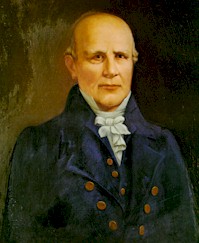One of the most prominent and influential politicians of the nineteenth century, Nathaniel Macon served as an advocate for the agricultural, social, and economic values of North Carolina. In a long and distinguished political career, Macon held various positions including U. S. Representative (with tenure as Speaker of the House) and U. S. Senator. He became a staunch advocate for states' rights and for slavery, as agriculture was the foundation of the Southern economy. Through his guidance, Macon helped to define the political climate of the day and laid the foundation for Southern politics of the present day.
Macon's austere political philosophy was indicative of his rustic upbringing in North Carolina. As the sixth child born to Gideon and Priscilla Macon on December 17, 1758, Nathaniel received a basic education at a makeshift school run by Charles Pettigrew in Bute (now Warren) County. In 1774, Macon was accepted to the College of New Jersey at Princeton, where he studied law among other topics. After graduation, Macon joined the New Jersey militia at the outbreak of the Revolutionary War.
Macon returned to North Carolina and was elected to the State Senate after the war's conclusion. His election was to be the point of departure for an extensive career in politics, which included twenty-four years in the House of Representatives, followed by a tenure in the United States Senate lasting more than a decade. Macon retired from politics at the age of seventy, choosing to spend his remaining days at his plantation, known as "Buck Spring," in Warren County. Macon died on June 29, 1837, and is buried near his house at Buck Spring.
Macon's political philosophy was simple, blunt, and unreserved, yet he commanded the respect and admiration from notable figures such as Thomas Jefferson, Andrew Jackson, and James Monroe. An ardent anti-federalist, Macon was wary of an overbearing federal government that strayed from guideposts of the Constitution, a pillar of the "Old Republican" ideology. In concordance with this belief, Macon declined several federal appointments, such as postmaster general. He was an outspoken critic against the Alien and Sedition acts of 1798, legislation that strengthened security at the expense of civil liberties. Fort Macon; Macon County; Macon, Georgia; and Virginia's Randolph-Macon College were named in his honor.
Source Citation:
"Nathaniel Macon." North Carolina Highway Historical Marker Program. http://www.ncmarkers.com/Markers.aspx?MarkerId=E-2
